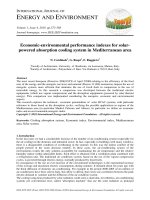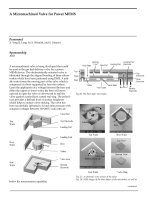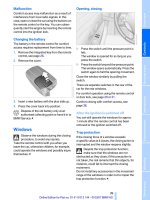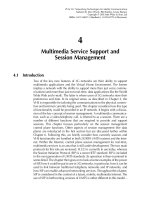Environmental Fiscal Reform for Poverty Reduction ppt
Bạn đang xem bản rút gọn của tài liệu. Xem và tải ngay bản đầy đủ của tài liệu tại đây (1.87 MB, 110 trang )
This DAC Reference Paper outlines key issues faced when designing Environmental Fiscal
Reform (EFR). EFR refers to a range of taxation and pricing measures which can raise fiscal
revenues while furthering environmental goals. The objective is to provide insights and
“good practice” on how development co-operation agencies can help developing countries
take advantage of EFR approaches in both their development and poverty reduction
strategies.
Experience in many countries has shown that despite their potential fiscal, poverty
reduction and environmental benefits, EFR measures are constrained by political and
institutional factors. Overcoming these factors requires thorough analysis of the political
context, followed by effective management of the reforms as an inclusive political process.
Accordingly, following a review of the instruments of EFR and related technical issues,
Environmental Fiscal Reform for Poverty Reduction focuses on the political economy
and governance aspects of EFR. This includes an examination of the precondition for
successful design and implementation, the various steps involved through the EFR Policy
Cycle, the challenges faced at each stage, and the main stakeholders involved. The role
of donors in supporting EFR processes is also outlined.
Subsequently, these issues are reviewed in relation to sectors of particular relevance for
developing countries: forestry, fisheries, fossil fuel, electricity, drinking water and industrial
pollution control.
The analysis and recommendations in this publication will be of use to policy makers
as well as to representatives of civil society groups and the private sector in developing
country partners.
DAC Guidelines and Reference Series
Environmental Fiscal Reform for Poverty Reduction
-:HSTCQE=UU][]\:
Environmental Fiscal Reform For Poverty Reduction
www.oecd.org
OECD’s books, periodicals and statistical databases are now available via www.SourceOECD.org, our online library.
This book is available to subscribers to the following SourceOECD themes:
Development Emerging Economies
Environment and Sustainable Development Taxation
Transition Economies
Ask your librarian for more details on how to access OECD books on line, or write to us at:
«
DAC Guidelines
and Reference Series
Environmental
Fiscal Reform for
Poverty Reduction
ISBN 92-64-00868-3
43 2005 16 1 P
DAC Guidelines and Reference Series
ORGANISATION FOR ECONOMIC CO-OPERATION AND DEVELOPMENT
DAC Guidelines and Reference Series
Environmental
Fiscal Reform
for Poverty Reduction
A DAC Reference Document
ORGANISATION FOR ECONOMIC CO-OPERATION
AND DEVELOPMENT
The OECD is a unique forum where the governments of 30 democracies work together to
address the economic, social and environmental challenges of globalisation. The OECD is also at
the forefront of efforts to understand and to help governments respond to new developments and
concerns, such as corporate governance, the information economy and the challenges of an
ageing population. The Organisation provides a setting where governments can compare policy
experiences, seek answers to common problems, identify good practice and work to co-ordinate
domestic and international policies.
The OECD member countries are: Australia, Austria, Belgium, Canada, the Czech Republic,
Denmark, Finland, France, Germany, Greece, Hungary, Iceland, Ireland, Italy, Japan, Korea,
Luxembourg, Mexico, the Netherlands, New Zealand, Norway, Poland, Portugal, the Slovak Republic,
Spain, Sweden, Switzerland, Turkey, the United Kingdom and the United States. The Commission of
the European Communities takes part in the work of the OECD.
OECD Publishing disseminates widely the results of the Organisation’s statistics gathering and
research on economic, social and environmental issues, as well as the conventions, guidelines and
standards agreed by its members.
Also available in French under the title:
Lignes directrices et ouvrages de référence du CAD
LA RÉFORME FISCALE ÉCOLOGIQUE AXÉE SUR LA RÉDUCTION DE LA PAUVRETÉ
© OECD 2005
No reproduction, copy, transmission or translation of this publication may be made without written permission. Applications should be sent to
OECD Publishing: or by fax (33 1) 45 24 13 91. Permission to photocopy a portion of this work should be addressed to the Centre
français d'exploitation du droit de copie, 20, rue des Grands-Augustins, 75006 Paris, France ().
This work is published on the responsibility of the Secretary-General of the OECD. The
opinions expressed and arguments employed herein do not necessarily reflect the official
views of the Organisation or of the governments of its member countries.
Foreword
It is an unfortunate fact that fiscal and environmental experts seldom communicate with one another.
They each have very different concerns, formal training and sets of jargon. You could even say that they
speak a different language. But so much is to be gained if we could create incentives for them to work
more together. Examples abound of thoughtfully designed fiscal measures (so-called market-based
instruments) that, when effectively implemented, can raise revenue while helping to further environmental
goals.This paper tells of many examples, and offers much new material highlighting the potential poverty
reduction benefits – surely an added incentive to work together.
If joint reform of fiscal and environmental measures – or “environmental fiscal reform” (EFR) –
can protect the environment, as well as raise revenue and free up resources – which can be allocated
to poverty reduction efforts – why don’t we see much more of it? For a start, designing effective EFR
requires a sound understanding of environmental and fiscal policy, as well as how each is regulated in
practice. This requires co-operation between fiscal and environmental experts, as well as colleagues in
development. But designing a sound proposal for EFR is only half the story. Experience shows that it
is also necessary to work across – and often to negotiate – hard political, social and institutional barriers
if proposals are to be effectively implemented.
The OECD has proven to be well-placed in mobilising fiscal, environmental, and development experts
to help us identify approaches to EFR that will work well in most developing countries. The experts
have paid particular attention to the “political economy” of EFR. This includes identifying likely “winners”
and “losers” from proposed reforms, how coalitions for change can be developed and nurtured, and how
best to deal with those likely to oppose progress. The role of donors in supporting the process of EFR is
also highlighted.
Preparing this document has been a challenge because it is rooted, not in tidy textbook solutions,
but in “real world” experiences. I think it has been well worth the effort. I hope you will agree. More
importantly, I hope that the analysis and recommendations contained in the document will be of use,
whether you are a policy maker, a representative of a civil society group or the private sector in
developing country partners. Sustainable development is about achieving integrated win-wins between
environmental, economic and social objectives – but too often it has to handle trade-offs where such
possibilities elude us. With real application of the guidance in this paper, I suspect we will see many
more win-win cases emerge in the not too distant future.
Steve Bass
Chair, ENVIRONET
FOREWORD
ENVIRONMENTAL FISCAL REFORM FOR POVERTY REDUCTION – ISBN 92-64-00868-3 – © OECD 2005
3
environment_fiscal_GB 30/05/05 22:08 Page 3
ENVIRONMENTAL FISCAL REFORM FOR POVERTY REDUCTION – ISBN 92-64-008683 – © OECD 2005
4
In order to achieve its aims the OECD has set up a number of specialised committees.
One of these is the Development Assistance Committee,whose members have agreed
to secure an expansion of aggregate volume of resources made available to developing
countries and to improve their effectiveness. To this end, members periodically review
together both the amount and the nature of their contributions to aid programmes, bilateral
and multilateral, and consult each other on all other relevant aspects of their development
assistance policies.
The members of the Development Assistance Committee are Australia,Austria, Belgium,
Canada, Denmark, Finland, France, Germany, Greece, Ireland, Italy, Japan, Luxembourg,
the Netherlands, New Zealand, Norway, Portugal, Spain, Sweden, Switzerland, the
United Kingdom, the United States and the Commission of the European Communities.
environment_fiscal_GB 30/05/05 22:08 Page 4
Acknowledgements
This document is the result of work undertaken by the OECD/DAC Network on Development Co-operation
and Environment (ENVIRONET).
The document was prepared by a team led by the United Kingdom (Mr. Paul Steele and Mr. Richard
Boyd) and Germany (Mr. Stephan Paulus, Mr. Harald Lossack and Mr. Jan-Peter Schemmel), supported
by the Netherlands (Mr. Piet Klop), Sweden (Mr.Thomas Sterner, Göteborg University), UNEP (Ms Anja
von Moltke), UNDP (Ms Linda Ghanime), the International Monetary Fund (Mr. Jim Prust), and the World
Bank (Mr. Jan Bojö). Experts from China (Mr. Zhong Ma, Renmin University of China), India (Ms. Divya
Datt, Tata Energy Research Institute; Mr. Subhash Garg, Ministry of Finance and Company Affairs;
Mr. K.K. Narang, Ministry of Environment and Forests) and South Africa (Mr. Cecil Morden, National
Treasury) provided valuable input. The OECD directorates responsible for Environment (Mr. Nils Axel
Braathen), Agriculture and Fisheries (Mr. Carl-Christian Schmidt and Mr. Bertrand Le Gallic), Fiscal
Affairs (Mr. Chris Heady) and Trade (Mr. Ron Steenblik), the International Energy Agency (Ms. Kristi
Varangu) and several other donor agencies have also participated actively throughout the whole process.
Messrs. Remy Paris and Georg Caspary of the OECD Secretariat provided substantive and managerial
assistance to the expert group, while Maria Consolati provided invaluable secretarial assistance.
Mr. Steve Bass, as Chair of ENVIRONET, provided guidance and advice throughout the exercise.
Four workshops were crucial in the development of this document:
● Scoping Workshop on Environmental Fiscal Reform (held on 30-31 January 2003 in Paris, and
hosted by the OECD).
● Fiscal Reform for Fisheries: To Promote Growth, Poverty Eradication and Sustainable Development
(held on 13-15 October 2003 in Rome, and hosted by the Food and Agriculture Organization of
the UN-FAO).
● Reforming Forest Fiscal Systems to Promote Poverty Reduction and Sustainable Development
(held on 19-21 October 2003 in Washington, DC, USA). This workshop was sponsored by the
World Bank, the UK Department for International Development (DFID), PROFOR and the German
Agency for Technical Co-operation (GTZ).
● Environmental Fiscal Reform for Sustainable Development and Poverty Reduction (held on
24-25 November 2003 in Berlin, and hosted by BMZ/GTZ).
The efforts and contributions of the sponsors and hosts of these workshops are gratefully
acknowledged.
ACKNOWLEDGEMENTS
ENVIRONMENTAL FISCAL REFORM FOR POVERTY REDUCTION – ISBN 92-64-008683 – © OECD 2005
5
.
environment_fiscal_GB 30/05/05 22:08 Page 6
TABLE OF CONTENTS
Table of Contents
Executive Summary 11
What is environmental fiscal reform? 12
How can it contribute to poverty reduction and development? 12
What are the objectives of this document? 12
Who is this document for? 13
Which EFR approaches apply to developing countries? 13
What key principles should EFR design follow? 14
EFR implementation: the “political economy” dimension 15
How can donors contribute? 16
Busy Readers’ Guide to this Publication 19
Part I
The Political Economy of Environmental Fiscal Reforms (EFR):
Overview of Key Issues
Chapter 1. Environmental Fiscal Reforms and Poverty Reduction 23
What is EFR? 24
How can EFR contribute to poverty reduction? 24
How does EFR fit in the current international development context? 24
Governance, transparency and public participation 25
EFR in developing countries: lessons from past experience and future prospects 25
Experience in OECD countries and economies in transition 26
EFR: Potential benefits and tradeoffs 27
Formulating EFR: key issues to consider 28
Chapter 2. The Instruments of EFR 31
Taxes on natural resource extraction 32
Product subsidies and taxes 32
Taxes on polluting emissions 34
User charges/fees 34
“Comprehensive EFR” 35
ENVIRONMENTAL FISCAL REFORM FOR POVERTY REDUCTION – ISBN 92-64-00868-3 – © OECD 2005
7
environment_fiscal_GB 30/05/05 22:08 Page 7
Chapter 3. Designing Reforms – The Politics of Making Trade-offs.
From Policy Formulation to Actual Implementation 37
Balancing objectives: a political process 38
Contextual factors for reform 38
Identifying winners and losers: the transmission channels of reform 40
Perspectives and interests of key stakeholders 41
Allocating revenue from EFR 43
The EFR policy cycle and the role of various stakeholders 45
Chapter 4. Conclusions and Recommendations for Donors 49
Basic facts about EFR 50
Key challenges of EFR design and implementation 51
The EFR policy cycle and donors’ roles 51
General principles to guide donors’ actions 54
Part II
Environmental Fiscal Reforms:
Political Challenges and Opportunities in Selected Sectors
Chapter 5. EFR in the Commercial-scale Forestry Sector 59
Key features of the sector: overview 60
Policies and instruments 61
Perspectives and interests of affected stakeholders 63
Managing the reform process: key steps 65
Chapter 6. EFR in the Commercial Fisheries Sector 67
Key features of the sector: overview 68
Policies and instruments 69
Perspectives and interests of main stakeholders 71
Managing the reform process: key steps 72
Chapter 7. EFR in the Fossil Fuel Sector 75
Key features of the sector: overview 76
Policies and instruments 77
Interests and perspectives of key stakeholders 79
Designing and managing the reform 80
Chapter 8. EFR in the Electricity Sector 83
Key features of the sector: overview 84
Policies and instruments 84
Interests and perspectives of affected stakeholders 86
Managing the reform process 87
Chapter 9. Drinking Water 89
Key issues in the sector 90
Financing water provision 90
ENVIRONMENTAL FISCAL REFORM FOR POVERTY REDUCTION – ISBN 92-64-00868-3 – © OECD 2005
TABLE OF CONTENTS
8
environment_fiscal_GB 30/05/05 22:08 Page 8
Policies and instruments 91
Perspectives and interest of key affected stakeholders 92
Fostering the reform process: some key steps 94
Chapter 10. Fiscal Measures for Industrial Pollution Control 97
Key issues in the sector 98
Policies and instruments 99
Interests and perspectives of key stakeholders 100
Managing the reform process: key elements 102
References 105
List of tables
1. Poverty impacts of selected EFR instruments 16
1.1. The multiple benefits of EFR 28
List of figures
3.1. Stylised representation of the stages of the EFR 45
7.1. Taxation of oil products as % of retail price (example: Kenya) 78
List of boxes
1.1. EFR in OECD countries 26
2.1. “Ecological Tax Reform” in Germany 35
5.1. Some guiding principles for forest policy 66
6.1. Improved fishery management and increased rent capture –
the case of Namibia 70
6.2. Hard bargaining for fishing agreements: experience in west Africa 73
7.1. Fuel subsidies in Indonesia and in the Islamic Republic of Iran 77
7.2. The impact on the poor of LPG subsidies 79
7.3. The difficulties provoked by fuel price hikes in Indonesia and Thailand 81
8.1. EFR in the power sector: experience from Ghana, Argentina and South Africa 88
9.1. Which water systems can countries afford? Matching plans
and resources 92
9.2. Assessing the affordability of water tariffs 95
9.3. Breaking the vicious cycle in Guinea/Conakri 95
10.1. Environmental standards in importing countries help
improve the Indian leather industry 101
10.2. Pollution levies in China and Central and Eastern European countries (CEES) 103
TABLE OF CONTENTS
ENVIRONMENTAL FISCAL REFORM FOR POVERTY REDUCTION – ISBN 92-64-00868-3 – © OECD 2005
9
environment_fiscal_GB 30/05/05 22:08 Page 9
.
environment_fiscal_GB 30/05/05 22:08 Page 10
Executive Summary
ENVIRONMENTAL FISCAL REFORM FOR POVERTY REDUCTION – ISBN 92-64-00868-3 – © OECD 2005
11
ISBN 92-64-00868-3
Environmental Fiscal Reform for Poverty Reduction
© OECD 2005
environment_fiscal_GB 30/05/05 22:08 Page 11
What is environmental fiscal reform?
“Environmental fiscal reform” (EFR) refers to a range of taxation and pricing measures
which can raise fiscal revenues while furthering environmental goals. The international
community has committed itself to the Millennium Development Goals (MDGs), including the
overarching target of halving extreme poverty by the year 2015. To help achieve the MDGs,
developing country governments need to mobilise revenue to invest in schools, health care,
infrastructure and the environment.
EFR can play an important role in pursuing the MDGs of “halving absolute poverty” and of
“reversing the loss of environmental resources by the year 2015”. Indeed, the UN Summits on
Financing for Development and on Sustainable Development in 2002 recognised the potential
contribution of EFR-related approaches. The latter stressed that poverty reduction and
improved environmental management go hand-in-hand.
How can EFR contribute to poverty reduction and development?
EFR can contribute to poverty reduction directly by helping address environmental
problems – such as water contamination and air pollution – that impact the poor. EFR can
also help indirectly,by generating or freeing up resources for anti-poverty programmes in
such areas as water supply and sanitation, or for pro-poor investments such as health and
education.
EFR is an important part of the development policy tool kit. EFR approaches and
instruments complement and strengthen regulatory and other approaches to fiscal and
environmental management.
ENVIRONMENTAL FISCAL REFORM FOR POVERTY REDUCTION – ISBN 92-64-00868-3 – © OECD 2005
EXECUTIVE SUMMARY
12
The multiple benefits of EFR
Fiscal benefits
a) Revenue mobilisation
b) Reduced distortions
c) Reduced drains on public finances
Environmental benefits
a) Pollution prevention and improved natural
resource management
b) Mobilisation of funds for investment in pollution
control and safe disposal of waste
c) Mobilisation of funds for enforcement activities
Poverty reduction benefits
a) Improved access to water, sanitation and
electricity services
b) Mobilisation of funds for pro-poor investments
(e.g. education)
c) Freeing up of financing to address environmental
and other problems that affect the poor
What are the objectives of this document?
This document outlines the key issues to be faced when designing EFR. The
objective is to provide insights and good practice on how development co-operation
agencies can help developing countries take advantage of EFR approaches in their
development and poverty reduction strategies.
environment_fiscal_GB 30/05/05 22:08 Page 12
Experience shows that despite its potential fiscal, poverty reduction and environmental
benefits, EFR measures are constrained by political and institutional factors. Overcoming
these factors requires thorough analysis of the political context, followed by effective
management of the reforms as an inclusive political process.Accordingly, following a review
of the instruments of EFR and related technical issues, the document focuses on the political
economy and governance aspects of EFR. This includes an examination of the precondition for
successful design and implementation, the various steps involved through the EFR policy cycle,
the challenges to be faced at each stage and the main stakeholders involved. The role of
donors in supporting EFR processes is also outlined. In Part II of the document, these issues
are reviewed in relation to sectors of particular relevance for developing countries: forestry,
fisheries, fossil fuel, electricity, drinking water and industrial pollution control.
Who is this publication intended for?
This document is primarily intended for decision makers and development policy
experts in donor organisations who support developing country partners on fiscal or
environmental policy issues, notably in the context of Poverty Reduction Strategies and
Sector-Wide Approaches. They include finance and environmental experts as well as sector
specialists working in such areas as forestry, fisheries, energy, water and transport. We also
know from experience that the most effective assistance is that which supports country-
led development programmes, and that builds on, rather than substitutes for, partners’ own
efforts.We therefore hope that the analysis and recommendations in this document will be
of use to policy makers as well as to representatives of civil society groups and the private sector
in partner countries.
Which EFR approaches apply to developing countries?
The range of EFR instruments is wide. Different EFR approaches and instruments are
applicable to different sectors and issues.This publication covers instruments most relevant
to developing countries. These include a) taxes on natural resource extraction such as
fisheries and forests, b) cost recovery and pricing measures to improve access to basic
services such as water and energy, c) taxes and subsidy reforms to discourage the use of
environmentally damaging products, and d) taxes and fees to control harmful industrial
pollution and waste.
EFR measures are feasible in most developing countries and indeed are applied by many.
However, different measures may be more appropriate for different countries and sectors.
While there can be no simple generalisation, they fall into the following broad groups:
● Natural resource pricing measures, such as taxes for forests and fisheries exploitation,
are relevant for most resource-rich countries – which tend to be low-income countries.
● Reforms of product subsidies and taxes are applicable to most countries, but particularly
energy producing countries where fuel subsidies are often high.
● Cost recovery measures, such as user charges on energy and water, are applicable to
most countries but must be implemented carefully to protect the poor.
● Pollution charges are particularly relevant for rapidly industrialising middle-income
countries where industrial pollution is a serious problem but administrative capacity
is relatively strong.
EXECUTIVE SUMMARY
ENVIRONMENTAL FISCAL REFORM FOR POVERTY REDUCTION – ISBN 92-64-00868-3 – © OECD 2005
13
environment_fiscal_GB 30/05/05 22:08 Page 13
Comprehensive approaches to development, such as sustainable development strategies,
poverty reduction strategies and sector-wide approaches provide important opportunities for
EFR.These approaches provide new opportunities to integrate EFR in the context of country-
led national and sectoral development plans.Medium-term expenditure frameworks (MTEF),
in particular, address directly issues relating to fiscal revenue collection and tax and pricing
reforms. A number of Poverty Reduction Strategy Papers make reference to EFR approaches
to address either fiscal or environmental objectives relevant to the poor.
What key principles should EFR design follow?
Taxing “bads” rather than “goods”. It is generally preferable to tax actual pollutants
(e.g. sulphur emissions) rather than inputs or products which are associated with the generation
of pollution (e.g. fuel which contains sulphur). Similarly waste collection treatment charges
should take account of actual volumes discharged and qualitative factors (such as concentration
of toxic substances), and discriminate against the most harmful emissions. In some cases,
however, discriminating approaches are not practical and more blunt instruments (such as
taxes on inputs or outputs) must be used.
Setting the level of taxes. Ideally, from an environmental standpoint, a tax should be
equal to marginal cost of abatement to provide incentives for actual pollution reduction. If it
is lower than that, firms will generally prefer to pay the tax.The charges would thus operate
primarily as a revenue raising mechanism with few pollution-reduction benefits. In practice,
however,low levels of taxes or charges can help establish the principle that industries should
pay for pollution and invest in research with new instruments.
Allocating the proceeds. Principles of public finance argue against allocated revenues
from taxes to pre-determined purposes (earmarking). At the same time, allocating at least a
share of the proceeds from environmental taxes to monitoring and enforcement activities
(partial earmarking) can be justified.This may be a price worth paying for having predictable
financing for environmental monitoring and enforcement activities, notably in countries
where environmental agencies are poorly resourced or heavily dependent on donor assistance.
It may also reinforce incentives to enforce environmental regulations and collect associated
taxes and fees as well as, importantly, to help generate public support for EFR.Allocating some
part of the proceeds from pollution taxes to the industry (“revenue recycling”) may also be
considered, in order to make the introduction of pollution charges politically more acceptable.
In such cases, it is essential for the financial reflows to industry to discriminate between good
and bad performers, and discourage continuous bad practice.
Respecting the principles of sound public finance. Revenues from EFR allocated to
environmental purposes must be managed in line with internationally-recognised principles
of sound public expenditures management, relating to fiscal discipline, efficient allocation
of public funds, operational efficiency, accountability, transparency and comprehensiveness
of the budget. Rigorous and regular evaluation is needed in this context.Where revenues are
used to encourage investment in environmentally preferable equipment and methods, this
should be strictly time-bound.
Matching instruments and implementation capacity. New instruments should be
developed within the context of existing regulatory and institutional frameworks.Their type
ENVIRONMENTAL FISCAL REFORM FOR POVERTY REDUCTION – ISBN 92-64-00868-3 – © OECD 2005
EXECUTIVE SUMMARY
14
environment_fiscal_GB 30/05/05 22:08 Page 14
and scope must match the institutional capacity to implement them. Good mechanisms
include pollution charges which can, for example, be collected and managed by environmental
protection agencies, which are responsible for monitoring and enforcing existing laws.
Pollution taxes “built in” to the national fiscal system and collected by fiscal authorities may
be more complex to implement. China, for example, first experimented with the first approach
for several years before moving to the second.
Building the capacity and credibility of environmental agencies. Monitoring agencies
must collect accurate and timely information on industrial pollution flows, their origins and
their impacts on, e.g. water and air quality. Partial earmarking of pollution taxes can help develop
and maintain the capacity of environmental monitoring agencies and protect them from
politically motivated attacks on their budget.
EFR implementation: the “political economy” dimension
The fiscal, environmental and poverty-reduction benefits of EFR can go hand-in-hand.
But this is not automatic.There can also be trade-offs between various objectives which must
be addressed explicitly. EFR requires careful policy design, taking account of issues relating
to i) equity; ii) fiscal and environmental effectiveness; iii) administrative feasibility and
efficiency and,iv) political feasibility.The “political economy”dimension is critical. Key aspects
of policy design and implementation include:
● Identifying likely winners and losers and understanding the perspectives and interests
of affected stakeholders – political leaders; poor and vulnerable groups; the private sector;
the government; civil society groups; and the media. How the revenue raised (or freed
up) as a result of reform is allocated is also crucial.
● “Building in” compensatory measures. Revenues from EFR can be allocated to poverty
reduction and environmental management purposes. In some cases, time-bound
support for affected communities and industries is necessary to secure political and
public support for reform.
● Building on public pressure. Public awareness and participation invariably play a key
role in building the necessary political will to enact and enforce pollution regulation,
and overcome resistance of industry. A key requirement is the public disclosure of
information on the health hazards from pollution as well as on industry’s impacts on
the environment. Such information must be made available to the public in ways that
are easy to understand. In some countries “shaming the polluters” by publishing
information on the performance of individual firms is an effective way to pressure them.
● Helping firms comply with standards. There are many low-cost ways for industrial
producers to reduce pollution and waste. Compared with standard methods, “cleaner
production techniques” use energy, raw materials and other inputs more efficiently,
leading to cost savings. By focusing on prevention, cleaner production approaches
reduce the need for “end of pipe” pollution control equipment.
● Sequencing reforms and combining instruments: Scheduling and announcing future
increases of charges or taxes in advance and allocating the proceeds to help firms
EXECUTIVE SUMMARY
ENVIRONMENTAL FISCAL REFORM FOR POVERTY REDUCTION – ISBN 92-64-00868-3 – © OECD 2005
15
environment_fiscal_GB 30/05/05 22:08 Page 15
invest in pollution control can facilitate adjustment and reduce resistance to the
introduction of charges. Gradual approaches also provide room for the necessary
consultation with affected industries.
ENVIRONMENTAL FISCAL REFORM FOR POVERTY REDUCTION – ISBN 92-64-00868-3 – © OECD 2005
EXECUTIVE SUMMARY
16
Table 1. Poverty impacts of selected EFR Instruments
Ways to enhance the benefits to the poor
Ensure that the poor are not negatively affected by
commercial-scale harvesting; and that revenues
intended for poor are not lost through corruption.
Channel resources for improved public transport.
Targeted subsidies for the poor (“lifeline tariffs”).
Targeted subsidies for the poor (“lifeline tariffs”).
Targeted subsidies.
Targeted subsidies.
Potential impacts on the poor
Generally positive if taxes are on commercial operators and
some revenues used to benefit
the poor.
Increased prices, especially of diesel, can increase cost of
public transport and general cost of living – especially for
remote communities.
Raises prices for the poor, depending on the extent to which
they are connected to grid (generally higher in urban areas).
Raises prices for the poor, depending on the extent to which
they are connected.
May raise prices for the poor, depending on their access to
irrigation services.
Depends on access of poor for fertilisers and pesticides.
Type of instrument
Rent taxes (minerals, forestry,
fisheries)
Petroleum excise taxes
Electricity user fees
Domestic water user fees
Irrigation user fees
Increased prices for fertiliser
and pesticides
How can donors contribute?
The EFR policy cycle involves a number of linked and often over-lapping phases. Donors
can play important roles at each stage:
a) Agenda setting stage
EFR must start with a clear identification and sound understanding of the issue to be
tackled, including notably its impact and causes and its relative importance in view of the
many pressing issues facing a country. Donors can play an important role in this regard by
supporting conferences and round tables placing the problem on the agenda as well as the
work of universities, research groups and international organisations in relevant areas.
b) Policy development stage
“Policy development” involves an assessment of the mix of instruments (fiscal and non-
fiscal) which could be used to address the problem identified most efficiently, given existing
socio-political and institutional conditions. It also includes identifying potential “winners”
and “losers” from reform and possible compensatory measures. Through their support to
various economic sectors, sustainable development strategies, poverty reduction strategies
and sector-wide approaches, donors can encourage integrated, cross-sectoral policy reforms
including in relation to EFR.This includes, in particular,ensuring that available opportunities
for “win-win” EFR approaches are not missed.
Donors can also support those sectors of government (such as finance or environment
ministries) who favour reform to overcome bureaucratic inertia or resistance from hostile
ministries or agencies.They can also encourage transparency, access to information concerning
environment_fiscal_GB 30/05/05 22:08 Page 16
public finances, public participation, and accountability, which are key preconditions for
sound policy development and, more generally “good governance”.They can support capacity
development, notably in the relation to the measurement of implicit taxes and subsidies and
the quantification of impacts.
c) Dialogue, information dissemination and advocacy stage
Identifying a problem and possible solutions is not enough. Securing political acceptance
and public support for EFR proposals often requires active advocacy, including through public
awareness campaigns. Where the problems associated with corruption and patronage are
serious, resistance to EFR and particularly around natural resources will be particularly strong
and building strong alliances is vital.
Donors can contribute to such dialogues and awareness-raising, including through
support to civil society groups.They can also support international sharing of experience and
dialogue on EFR among developing country governments, international organisations and NGOs.
Examples of this include current initiatives, for example, on the transparency of extractive
industries (Extractive Industries Transparency Initiative – EITI) and illegal logging (Forest Law
Enforcement Governance and Trade Process – FLEGT). Donor agencies can also make available
information on reform experiences from OECD countries, bearing in mind that many of these
also face various challenges in implementing successful EFR.*
d) Implementation stage
Implementation generally starts with public announcement of upcoming reforms
preferably early on. It is important to give affected parties the time to prepare and adapt to
the proposed changes. Gradual phasing-in of reforms is another way to reduce the transition
costs, although it may increase the risks of loss of momentum.
Donors can play an important role by helping to finance the transitional costs of reform,
in order to protect the poor from negative impacts or to overcome politically powerful
blockages. This also includes supporting technical co-operation to help industries adjust to
change (e.g. by switching to cleaner production techniques).
e) Building the credibility of monitoring and enforcement agencies
Credibility is essential to sustain support for reform,and confront challenges.This includes,
for example, resistance from affected industries which have direct interests in portraying the
environmental monitoring and enforcement agency as unprofessional, corrupt, or abusive. Hence,
support to build the capacity of agencies to monitor and enforce compliance with applicable
regulations is crucial. Environmental agencies must also be credible vis-à-vis ministries of finance.
This includes, in particular, conforming to rules and principles of public expenditure management.
This is particularly crucial when they are entrusted with the collection and management of
taxes or fees or when the proceeds from environmental taxes and fees are earmarked and
transferred to them for environmental management purposes.The capacity of fiscal authorities
EXECUTIVE SUMMARY
ENVIRONMENTAL FISCAL REFORM FOR POVERTY REDUCTION – ISBN 92-64-00868-3 – © OECD 2005
17
*For instance, while various OECD countries have substantially extended the use of environmental
taxes since the early 1990s, there are currently still many exemptions and tax rate reductions currently
granted to sectors most exposed to international competition. For a more detailed discussion of these
issues, see OECD (2004), Implementing Sustainable Development: Key Results 2001-2004.
environment_fiscal_GB 30/05/05 22:08 Page 17
to collect and administer existing taxes (including compliance monitoring and enforcement)
may also need to be enhanced for proposals for fiscal reforms to be credible.
Donors can play important roles in providing technical assistance to develop partners’
capacity in all these areas. In the case of natural resources, this may include the formulation
of new management regimes as well as the formalisation and registration of property rights.
General principles to guide donors’ actions in all these areas include:
1. Country ownership and sensitivity to the local context
In their policy dialogue on EFR, donors must take full take account of local conditions.
Donors should encourage country ownership and not force the pace.Donor agencies also
have to be sensitive to political challenges of EFR and attuned to the cultural and historic
particularities. They should avoid imposing “blueprints”, but instead provide financial,
technical, institutional and political support to countries’ own efforts. Strong country
ownership, in turn, encourages donor harmonisation and will shield countries from
excessive donor intrusion.
2. Readiness to act opportunistically and to be pragmatic
In a politically and economically volatile environment, it is crucial to take advantage of
windows of opportunities as and when they arise.A new political leadership – especially
if it has popular support – can be the catalyst for major policy shifts. Donors should be
prepared to seize on the new opportunities for reforms which this creates.
It may also be necessary – and justified in some cases – to deviate from standard fiscal
practice and to assign some part of tax revenues from EFR to a particular use in order to
secure political will and/or public support for important reforms. In such cases, donors
can play an important role in working with fiscal authorities to ensure that appropriate
safeguards are put in place to ensure consistency with efforts towards fiscal consolidation.
3. Harmonisation, alignment and policy coherence
In EFR, as in other areas, donor support should be harmonised – with donors working
together to avoid duplication of missions, studies or institutions. And it should be aligned
behind country-owned and led strategies and procedures.Accordingly, EFR measures should
be conceived within the context of PRSPs, sustainable development strategies, medium-
term expenditures programmes and sector-wide approaches. More generally, donors
should also ensure that their efforts toward poverty reduction,environmental sustainability
and sound economic and fiscal management are mutually supportive.
Coherence between development policies and other policy areas is also vital: donor
countries can undermine the objectives of their development co-operation policies by
inconsistent policies in other areas. Donor agencies should strive to raise this issue
within their governments to draw attention to this risk and try to minimise it. For example,
donor agencies should raise awareness in their governments of, e.g. agricultural policies
which distort world market prices, or fisheries agreements with developing countries which
run against environment and poverty reduction objectives.
ENVIRONMENTAL FISCAL REFORM FOR POVERTY REDUCTION – ISBN 92-64-00868-3 – © OECD 2005
EXECUTIVE SUMMARY
18
environment_fiscal_GB 30/05/05 22:08 Page 18
EXECUTIVE SUMMARY
ENVIRONMENTAL FISCAL REFORM FOR POVERTY REDUCTION – ISBN 92-64-00868-3 – © OECD 2005
19
Busy Readers’ Guide to this Document
What is Environmental Fiscal Reform (EFR)? Chapter 1 Page 24
How can EFR contribute to poverty reduction? Chapter 1 Page 24
What are the instruments of EFR? Chapter 2 Page 31
What are the key components in the successful design of EFR? Chapter 3 Page 37
What is the EFR policy cycle? Chapter 4 Page 45
What are key actions and roles for donors in EFR? Chapter 4 Page 49
What are the main political challenges and opportunities for EFR in the following key sectors:
Forestry: Chapter 5 Page 59
Fisheries: Chapter 6 Page 67
Fossil Fuels: Chapter 7 Page 75
Electricity: Chapter 8 Page 83
Drinking Water: Chapter 9 Page 89
Industrial Pollution Control: Chapter 10 Page 97
environment_fiscal_GB 30/05/05 22:08 Page 19
.
environment_fiscal_GB 30/05/05 22:08 Page 20
PART I
The Political Economy of
Environmental Fiscal Reform
(EFR): Overview of Key Issues
ENVIRONMENTAL FISCAL REFORM FOR POVERTY REDUCTION – ISBN 92-64-00868-3 – © OECD 2005
21
Part I of this DAC Reference Document outlines key issues to be faced when designing
Environmental Fiscal Reform (EFR). EFR refers to a range of taxation and pricing
measures which can raise fiscal revenues while furthering environmental goals. Specific
sectors reviewed include forestry, fisheries, fossil fuel, electricity, drinking water, and
industrial pollution. The objective is to provide insights and “good practice” on how
development co-operation agencies can help developing countries take advantage of EFR
approaches in their development and poverty reduction strategies.
Following a review of the instruments of EFR and related technical issues, the document
focuses on the political economy and governance aspects of EFR. This includes an
examination of the preconditions for successful design and implementation, the various
steps involved through the EFR Policy Cycle, the challenges to be faced at each stage
and the main stakeholders involved. The role of donors in supporting EFR processes is
also outlined.
environment_fiscal_GB 30/05/05 22:08 Page 21
.
environment_fiscal_GB 30/05/05 22:08 Page 22
PART I
Chapter 1
Introduction:
Environmental Fiscal Reforms
and Poverty Reduction
ENVIRONMENTAL FISCAL REFORM FOR POVERTY REDUCTION – ISBN 92-64-00868-3 – © OECD 2005
23
ISBN 92-64-00868-3
Environmental Fiscal Reform for Poverty Reduction
© OECD 2005
environment_fiscal_GB 30/05/05 22:08 Page 23
What is EFR?
“Environmental fiscal reform” (EFR) refers to a range of taxation and pricing measures
which can raise fiscal revenues while furthering environmental goals.This includes taxes on
natural resource exploitation or on pollution. EFR can directly address environmental problems
that threaten the livelihoods and health of the poor. EFR can also free up economic resources
or generate revenues that can help to finance access of the poor to water, sanitation and
electricity services.
Different EFR approaches and instruments are applicable to different sectors and issues.
These instruments do not substitute for but complement and strengthen regulatory and
other approaches to fiscal and environmental management. EFR instruments should therefore
be thought of components of fiscal and environmental policy mixes, not as “stand alone”policy
packages. Similarly, it is only one of the ways through which fiscal authorities can raise
additional revenue.This document covers instruments relating to natural resource extraction,
environmentally damaging products, air and water pollution and cost recovery instruments
for environmental management infrastructure.
1
How can EFR contribute to poverty reduction?
EFR can contribute to poverty reduction directly by helping address environmental problems
that threaten the health and livelihoods of the poor such as water contamination and air
pollution. EFR can also help generate resources, notably to help achieve Millennium Development
Goals (MDGs) and for other pro-poor programmes. For example, it can help finance investment
in infrastructure critical for the poor,such as water supply and sanitation. It can also help finance
other pro-poor investments or services in areas such as education and health.
2
How does EFR fit in the current international development context?
There is renewed interest in EFR for several reasons. The international development
agenda is now strongly focused on the Millennium Development Goals (MDGs). These include
the goals to eradicate extreme poverty and hunger and ensure environmental sustainability.
The World Summit on Sustainable Development (WSSD) held in South Africa in 2002 re-affirmed
the MDGs and stressed that poverty reduction and improved environmental management go
hand in hand. The WSSD Plan of action calls upon governments to “… continue to promote the
internalisation of environmental costs and the use of economic instruments, taking into account the
approach that the polluter should, in principle, bear the costs of pollution, with due regard to the public
interest and without distorting international trade and investment”.
3
The Financing for Development Conference, held in 2002 in Monterrey, also emphasised the
importance of mobilising domestic resources for development including through efficient tax
systems. EFR is one of the ways to increase domestic resource mobilisation.
ENVIRONMENTAL FISCAL REFORM FOR POVERTY REDUCTION – ISBN 92-64-00868-3 – © OECD 2005
I.1. INTRODUCTION: ENVIRONMENTAL FISCAL REFORMS AND POVERTY REDUCTION
24
environment_fiscal_GB 30/05/05 22:08 Page 24









